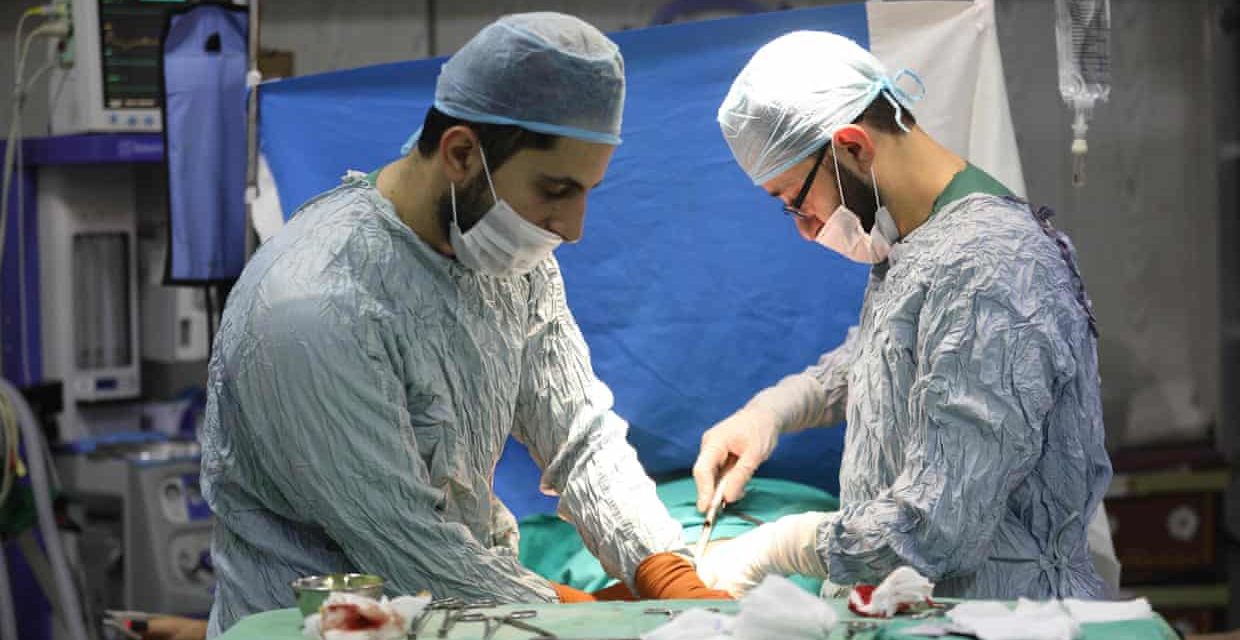“When people ask me about Syria, those are the ones that I want remembered.
As Russia, Iran, and the Assad regime threaten an offensive on the last major opposition area in northwest Syria, with more than 3 million people in Idlib and northern Hama Provinces, Samer Attar of the Syrian American Medical Society writes for The Guardian:
I can still see them in my nightmares: dead children in white shrouds staring at me with frozen eyes. I saw them all the time when I worked in Aleppo.
I just returned from my last trip working in northern Syria. This time I was spared these horrors.
You can spot life attempting to return to normal: cafes and markets and fruit stands. But you still see refugee families struggling in tents amid 38C heat. Many escaped from Aleppo and war-torn areas in the south. They had nowhere else to go.
I was reunited with the doctors and nurses I had worked with in Aleppo. They have set up shop here in local hospitals. Life has to go on. The suffering doesn’t end when the bombs clear. And there’s always work for doctors in this setting.
Most of the cases here are routine health issues. Much of it was cold trauma: patients who have survived their injuries but now have to deal with the aftermath of disability and impairment.
One young man had his left leg obliterated from shrapnel. He had spent months undergoing multiple operations and reconstructions to save it. Now it was just an accordion of indurated flesh and brittle bone. His only option was an amputation above the knee.
Another young man’s hip had been shattered by a bomb blast. His pelvis was an infected and distorted jumble of bones, leaving him with a flail hip and a shortened leg. No surgery here can help him. He was left to hobble on a crutch.
A child had her hand nearly blown off in Aleppo. It had been sutured back on. All of her tendons and bones had scarred into a contracted, useless hand. No reconstruction here could help.
We saw a lot of patients like this. You help who you can, and console those you can’t.
However, what was a quiet day here in the north was a bloodbath for doctors in Idlib farther south. On the same day, aerial bombardments had killed more than 40 people. A local doctor texted that it was like Aleppo all over again. Mutilated bodies, dead children, floors smeared with body parts and pooled with blood until it stains your ankles.
“Good People Rise to the Occasion”
This is just a preview of what is to come as the Syrian government ratchets up its offensive to reclaim Idlib – home to 3 million people. They will not spare homes, schools, or hospitals to achieve victory.
I come home after these trips and pundits who haven’t set foot in Syria say that it is too complicated and nothing can be done. I dare them to spend one day volunteering in a Syrian field hospital – amputating children’s limbs, mopping body parts off the floor, and placing mutilated children in makeshift body bags. Then have them tweet from their armchairs and cafes that nothing can or should be done.
There are horrible things happening all over the world – shootings and bombings and mass killings. In Syria, these horrors are the daily norm. But good people always rise to the occasion. You see that in people who rush to aid the wounded.
I saw that in the Syrian people who stayed behind – the nurses, the doctors, the schoolteachers. They are men and women who work in schools, hospitals and orphanages with no protection from artillery and airstrikes. They endure these conditions unarmed on a daily basis. They do so knowing that they are abandoned by the world and on their own.
I got to see some of them this last trip: friends and colleagues from Aleppo. Many are working now in Idlib. One of the bravest men I met in Syria was the hospital janitor. When he wasn’t mopping up blood and body parts, he was lifting patients off the floor and carrying them to the operating room. He was a rock, always poised and unflappable for the next incoming assault of wounded and dying – even though he knew he might end up on the floor dead or dismembered next to the people he was trying to help.
People like him told me that they would rather risk dying inside Syria saving lives, then grow old comfortably from a distance watching their world fall apart. They taught me that there are some causes worth fighting and dying for, and that there are ways to fight terrorism and oppression that don’t require bombs and bullets. Sometimes all you have to do is show up and help out. When people ask me about Syria, those are the ones that I want remembered.
I know that no one is coming to help them. We hear “never again”. Really it’s all more of the same. When the slaughter in Idlib is over, we’ll ask once more how we let this happen. All I can do from here is bear witness and share their voices.


“They are men and women who work in schools, hospitals and orphanages with no protection from artillery and airstrikes. ”
What about those with no protection from grad rockets, mortars and shells fired by the rebels into government controlled areas? Are we to believe there are no such men and women doing the same job in these regions?